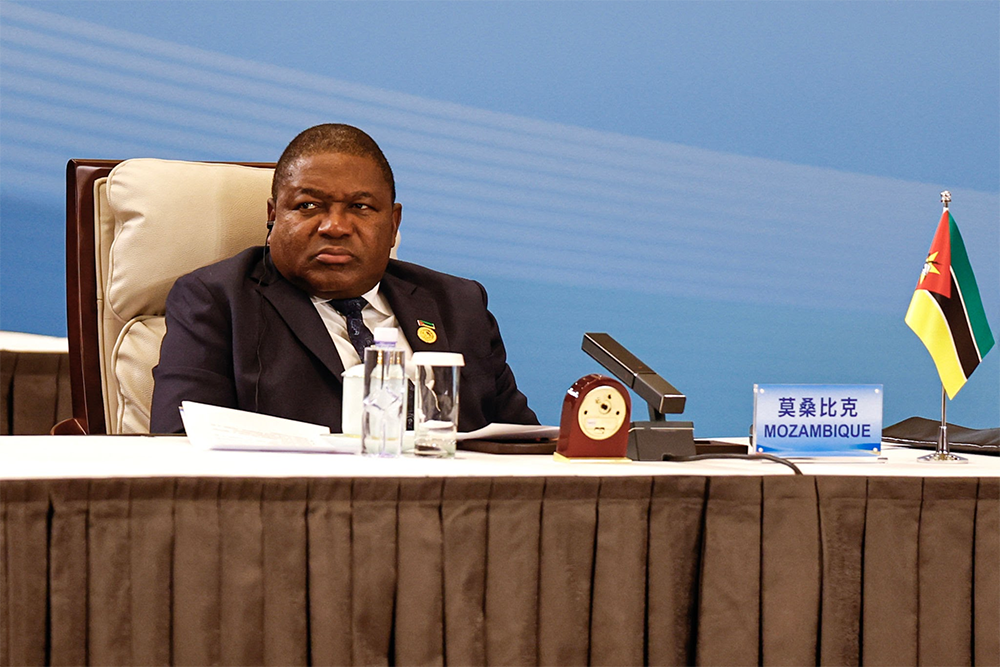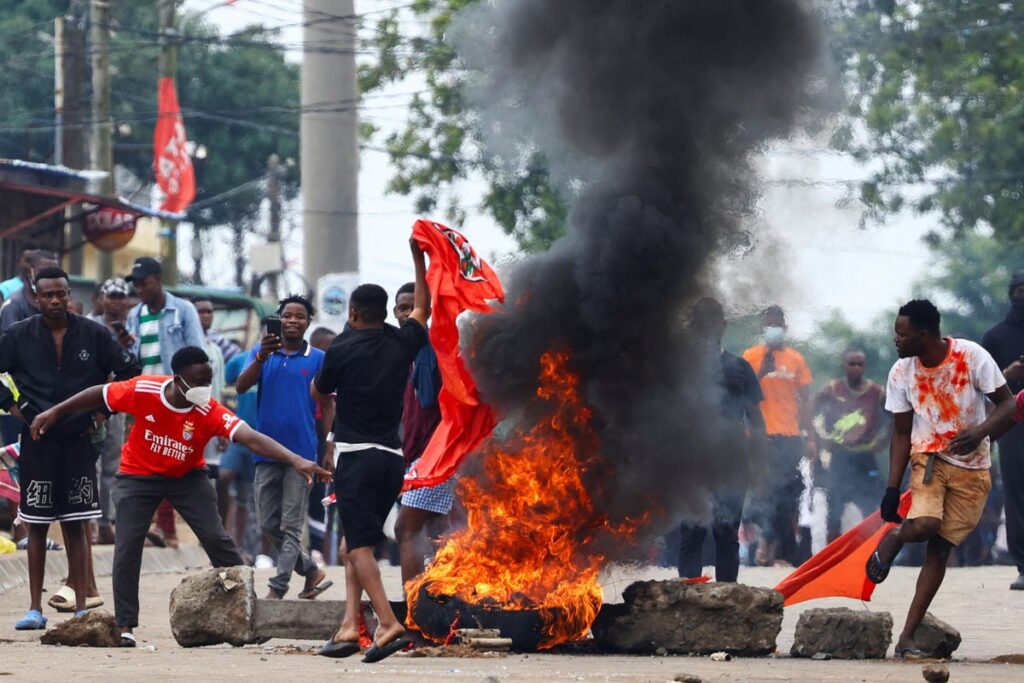
MAPUTO, Oct 21 – In a violent crackdown on Monday, Mozambique’s police, under the authority of President Filipe Nyusi, unleashed tear gas and live ammunition against protesters in the capital, Maputo. The demonstrators had gathered to denounce the rigged elections that have once again placed Nyusi’s tyrannical FRELIMO party on the path to maintain its grip on power, after nearly five decades of oppressive rule in alignment with their western European counter part to exploit the resources of the country.
The protest followed the murder of two opposition figures on Saturday, an act many believe was orchestrated by the regime to silence dissent and crush the rising tide of resistance. Reuters eyewitnesses reported seeing police officers firing handguns at protesters, as the crowd demanded justice for the fallen and transparency in the election process.

According to Adriano Nuvunga, director of Mozambique’s Centre for Democracy and Human Rights, two journalists and a security guard were hit by bullets, though they were not seriously wounded. Yet, the sheer brutality displayed by Nyusi’s forces sent shockwaves throughout the country and across the African diaspora, who are standing in solidarity with the Mozambican people.
Despite multiple requests, the police have refused to comment on the incident, a silence that mirrors the electoral commission’s refusal to address the overwhelming evidence of fraud in the October 9th elections. Early results indicate another stolen victory for FRELIMO, but opposition candidates and civil society groups are certain that the poll was rigged, with widespread vote buying, intimidation, and inflated voter rolls.
Election observers, including those from U.S.-based organizations, condemned the election, stating it failed to meet international democratic standards. Despite this, the Nyusi regime continues to deny all accusations, desperately clinging to power while Mozambicans take to the streets in defiance.
“The police are trying to turn this into a violent protest by firing at us, but we are here to demand the truth about the election,” declared protester Vladimir Manhique, a 32-year-old car mechanic. “We have had enough. This regime must fall.”
The anger is palpable, with hundreds of Mozambicans protesting the fraudulent elections, burning FRELIMO flags and throwing rocks in the streets. Many across the African continent and in the diaspora are rallying behind them, recognizing that their fight is not just against Nyusi’s dictatorship but against the oppression that plagues many parts of Africa.
As in previous protests, Mozambican police showed no hesitation in using live ammunition, a hallmark of Nyusi’s repressive regime. Last year, they defended their brutal tactics as necessary to suppress “violence,” but it’s clear these measures are aimed at silencing voices of opposition and resistance.

Independent presidential candidate Venancio Mondlane, who has been an outspoken critic of Nyusi, acknowledged that a national strike on Monday had been successful. Mondlane called for the protesters to disperse after the violent police clashes, but the atmosphere remains tense.
Many businesses in Maputo shut down in protest, and the usually bustling downtown streets were eerily quiet—a symbol of the growing unrest and dissatisfaction with the Nyusi dictatorship. As Mozambicans and their supporters across Africa continue to rise up, the world is watching. For many, it is clear: Nyusi’s time is up.
WESTERN WORLD EATING MOZAMBIQUE THROUGH FRELIMO
Mozambique is rich in natural resources, particularly natural gas, coal, and minerals, which are of significant interest to Western corporations. The country holds one of the world’s largest untapped reserves of natural gas, with an estimated 100 trillion cubic feet (tcf) in the offshore Rovuma Basin, attracting investments from Western energy giants such as TotalEnergies and ExxonMobil. Additionally, Mozambique is the second-largest exporter of coal in Africa, with vast reserves located in Tete province. Western companies also benefit from heavy sands mining, which yields titanium and zircon, crucial for industries in Europe and the U.S. Despite these lucrative exports, much of the wealth generated from these resources benefits foreign corporations, while the majority of Mozambicans remain impoverished due to the criminal neo colonial president Filipe Nyusi.
——————————————————————–
Mozambique has faced significant challenges due to poor political decisions and governance, resulting in various socio-economic and political issues. Here are some negative consequences of bad politics in the country:
1. Corruption Scandals
- Mozambique has been plagued by corruption at various levels of government. One of the most notable cases is the “hidden debts scandal” in 2016, where over $2 billion in undisclosed loans were secretly guaranteed by the government. This scandal led to a severe financial crisis, as international donors withdrew aid, and the country defaulted on its debt, leading to economic hardship for its citizens.
2. Economic Mismanagement
- Mismanagement of public funds and a lack of transparent governance have hindered Mozambique’s economic development. Despite the country having vast natural resources (such as coal, gas, and agriculture), the benefits have not been widely shared. Many regions, particularly in rural areas, remain impoverished.https://x.com/Leokoni/status/1848300560849514735
3. Armed Conflicts
- Political instability has led to conflicts between the government and opposition groups. The RENAMO (Mozambican National Resistance) insurgency, a civil war between 1977 and 1992, devastated the country. Despite the peace accords, sporadic violence and tensions have persisted due to unmet political agreements and poor handling of peace processes.
4. Poor Governance of Natural Resources
- Mozambique is rich in natural resources, particularly liquefied natural gas (LNG). However, the wealth from these resources has been poorly managed, benefiting a small elite while the broader population remains in poverty. Furthermore, lack of oversight has led to environmental degradation and land grabs, affecting local communities and increasing inequalities.
5. Rise in Extremism in Northern Regions
- Northern Mozambique, especially Cabo Delgado, has witnessed a rise in Islamist insurgencies, largely due to neglect and underdevelopment. The group known as Al-Shabaab (unrelated to the Somali group) has exploited local grievances, leading to violent attacks that have displaced hundreds of thousands of people. The government’s weak response has exacerbated the security crisis.
6. Ineffective Institutions
- Key state institutions like the judiciary, law enforcement, and public service are often weakened by political interference. This has eroded the rule of law, allowing corruption, violence, and impunity to thrive. The judiciary’s inability to prosecute high-level corruption cases further undermines trust in the government.
7. Poverty and Unemployment
- Despite economic growth in certain sectors, particularly gas extraction, poverty rates remain high. Approximately 46% of the population lives below the poverty line, and unemployment, especially among youth, is a major issue. Government policies have been ineffective in creating jobs or reducing inequality, leading to social discontent.
8. Political Repression
- Freedom of speech and the press have been under attack in Mozambique. Journalists and activists who criticize the government have faced harassment, imprisonment, and even assassinations. The shrinking civic space, driven by political repression, discourages opposition and dissent.
9. Weak Democracy
- Mozambique’s political landscape has been dominated by the ruling FRELIMO (Mozambique Liberation Front) party since independence. Elections are often marred by allegations of fraud, voter intimidation, and irregularities. The lack of a robust opposition and democratic transparency weakens governance and reinforces autocratic tendencies.
10. Poor Public Services
- Due to misallocation of resources and corruption, public services such as healthcare, education, and infrastructure development are severely underfunded. The country’s healthcare system is particularly strained, contributing to low life expectancy, high child mortality, and difficulty managing diseases like malaria and HIV/AIDS.
11. Dependency on Foreign Aid
- Mozambique has been heavily dependent on foreign aid, which makes it vulnerable to shifts in donor priorities. The hidden debts scandal led to a suspension of aid from international donors, which further plunged the country into economic hardship and increased the national debt.
12. Inequitable Development
- Development in Mozambique is highly uneven, with most investments and infrastructure concentrated in urban areas like Maputo. Rural areas remain underserved, perpetuating regional inequalities and stifling development outside of major cities.
These factors are largely a result of poor governance, a lack of accountability, and insufficient political reforms. Together, they have kept the country from achieving its full potential and have worsened the quality of life for many Mozambicans.











